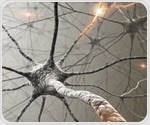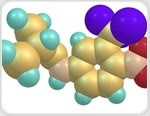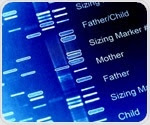| |  In a step toward better diagnosis and treatment of digestive conditions, such as inflammatory bowel disease, scientists report in ACS Biomaterials & Engineering that they have developed a first-of-its-kind collagen-based membrane for use in microchips. In a step toward better diagnosis and treatment of digestive conditions, such as inflammatory bowel disease, scientists report in ACS Biomaterials & Engineering that they have developed a first-of-its-kind collagen-based membrane for use in microchips. | |
|
| |  University Hospitals Harrington Heart & Vascular Institute researchers Muhammad Panhwar, MD, and Mahazarin Ginwalla, MD, recently concluded a study of more than 22 million patients that suggests a strong connection between Inflammatory Bowel Disease (IBD) and the development of heart disease and heart attacks. University Hospitals Harrington Heart & Vascular Institute researchers Muhammad Panhwar, MD, and Mahazarin Ginwalla, MD, recently concluded a study of more than 22 million patients that suggests a strong connection between Inflammatory Bowel Disease (IBD) and the development of heart disease and heart attacks. | |
|
| |  Cells in the nervous system can "put the brakes" on the immune response to infections in the gut and lungs to prevent excessive inflammation, according to research by Weill Cornell Medicine scientists. This insight may one day lead to new ways to treat diseases caused by unchecked inflammation, such as asthma and inflammatory bowel disease. Cells in the nervous system can "put the brakes" on the immune response to infections in the gut and lungs to prevent excessive inflammation, according to research by Weill Cornell Medicine scientists. This insight may one day lead to new ways to treat diseases caused by unchecked inflammation, such as asthma and inflammatory bowel disease. | |
|
| |  An analysis of medical-record data from more than 17.5 million patients found that people with inflammatory bowel disease (IBD) are at elevated risk for a heart attack, regardless of whether or not they have traditional risk factors for heart disease such as high cholesterol, high blood pressure and smoking. An analysis of medical-record data from more than 17.5 million patients found that people with inflammatory bowel disease (IBD) are at elevated risk for a heart attack, regardless of whether or not they have traditional risk factors for heart disease such as high cholesterol, high blood pressure and smoking. | |
|
| |  The omega-3 fatty acids are polyunsaturated fatty acids with powerful effects on the immune system primarily through their anti-inflammatory activity. The most potent among them are eicosapentaenoic acid (EPA) and docosahexaenoic acid (DHA), both of which are found in fish oil. The omega-3 fatty acids are polyunsaturated fatty acids with powerful effects on the immune system primarily through their anti-inflammatory activity. The most potent among them are eicosapentaenoic acid (EPA) and docosahexaenoic acid (DHA), both of which are found in fish oil. | |
|
| |  Uterine artery embolization (UAE) is a procedure in which the branch of the uterine artery that supplies a fibroid is blocked by foreign material. Uterine artery embolization (UAE) is a procedure in which the branch of the uterine artery that supplies a fibroid is blocked by foreign material. | |
|
| |  Antiandrogens are a group of medications which bind to intracellular androgen receptors (AR) to prevent androgen effects on organs such as the testes, the hair follicles, the hypothalamus, pituitary, ovaries and the prostate gland, which are targets of endogenous androgens. They are used to treat a variety of clinical conditions which are characterized by hyperandrogenism, such as acne, hirsutism, and prostate cancer. Antiandrogens are a group of medications which bind to intracellular androgen receptors (AR) to prevent androgen effects on organs such as the testes, the hair follicles, the hypothalamus, pituitary, ovaries and the prostate gland, which are targets of endogenous androgens. They are used to treat a variety of clinical conditions which are characterized by hyperandrogenism, such as acne, hirsutism, and prostate cancer. | |
|
| |  Microsporidia are spore-forming intracellular organisms that are omnipresent in the environment and that have the propensity of infecting a myriad of vertebrate and invertebrate hosts. Fifteen different species have been described to be affecting humans, many of which as opportunistic disease agents in association with HIV/AIDS epidemic. Microsporidia are spore-forming intracellular organisms that are omnipresent in the environment and that have the propensity of infecting a myriad of vertebrate and invertebrate hosts. Fifteen different species have been described to be affecting humans, many of which as opportunistic disease agents in association with HIV/AIDS epidemic. | |
|
| |  Campylobacteriosis is the term used to refer to the group of infectious foodborne diseases caused by several species of Campylobacter. Campylobacteriosis is the term used to refer to the group of infectious foodborne diseases caused by several species of Campylobacter. | |
|
| |  Tim Muldoon, assistant professor of biomedical engineering, has received a $500,000 Faculty Early Career Development Program award from the National Science Foundation to continue his work on an endoscopic probe that can be used in colonoscopies. Tim Muldoon, assistant professor of biomedical engineering, has received a $500,000 Faculty Early Career Development Program award from the National Science Foundation to continue his work on an endoscopic probe that can be used in colonoscopies. | |
|
| |  Viruses are intracellular parasites that cause disease by infecting the cells in the body and, in a study published today in Nature Microbiology, researchers at Children's Hospital of Pittsburgh of UPMC and the University of Pittsburgh School of Medicine showed how a common virus hijacks a host cell's protein to help assemble new viruses before they are released. Viruses are intracellular parasites that cause disease by infecting the cells in the body and, in a study published today in Nature Microbiology, researchers at Children's Hospital of Pittsburgh of UPMC and the University of Pittsburgh School of Medicine showed how a common virus hijacks a host cell's protein to help assemble new viruses before they are released. | |
|
| |  The genetic cause behind a strain of typhoid's resistance to five classes of antibiotics has been uncovered by scientists at the Wellcome Sanger Institute and their collaborators at Public Health England and Aga Khan University, Pakistan. The genetic cause behind a strain of typhoid's resistance to five classes of antibiotics has been uncovered by scientists at the Wellcome Sanger Institute and their collaborators at Public Health England and Aga Khan University, Pakistan. | |
|
| |  Dramatic calorie restriction, diets reduced by 40 percent of a normal calorie total, have long been known to extend health span, the duration of disease-free aging, in animal studies, and even to extend life span in most animal species examined. Dramatic calorie restriction, diets reduced by 40 percent of a normal calorie total, have long been known to extend health span, the duration of disease-free aging, in animal studies, and even to extend life span in most animal species examined. | |
|
| |  Researchers have identified a protein in saliva (histatin-5) that protects the body from traveler's diarrhea. Researchers have identified a protein in saliva (histatin-5) that protects the body from traveler's diarrhea. | |
|
| |  Scientists have identified a single genetic change in Salmonella that is playing a key role in the devastating epidemic of bloodstream infections currently killing around 400,000 people each year in sub-Saharan Africa. Scientists have identified a single genetic change in Salmonella that is playing a key role in the devastating epidemic of bloodstream infections currently killing around 400,000 people each year in sub-Saharan Africa. | |
|
| |  A new Alimentary Pharmacology & Therapeutics analysis has found a link between the development of inflammatory bowel disease and a past history of weight loss surgery. A new Alimentary Pharmacology & Therapeutics analysis has found a link between the development of inflammatory bowel disease and a past history of weight loss surgery. | |
|
| |  Celiac disease is an autoimmune disorder that affects by some estimates nearly 1 in 100 people. Celiac disease symptoms are triggered by gluten, a protein found in wheat and related plants, but gluten doesn't act alone to cause the digestive symptoms that patients suffer. Celiac disease is an autoimmune disorder that affects by some estimates nearly 1 in 100 people. Celiac disease symptoms are triggered by gluten, a protein found in wheat and related plants, but gluten doesn't act alone to cause the digestive symptoms that patients suffer. | |











































.png)









No hay comentarios:
Publicar un comentario